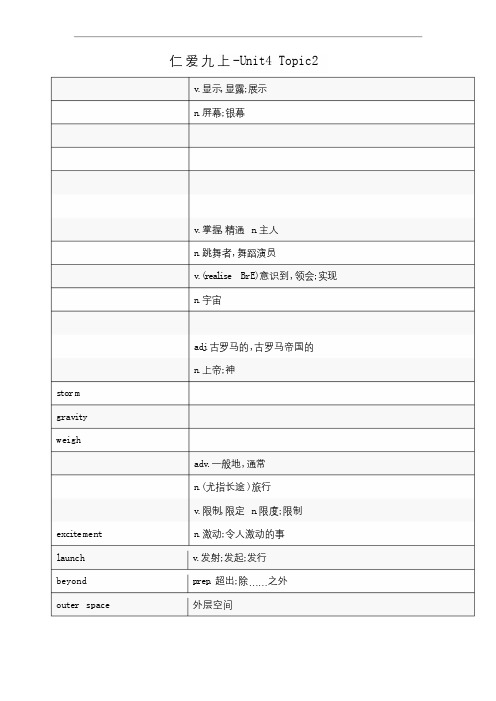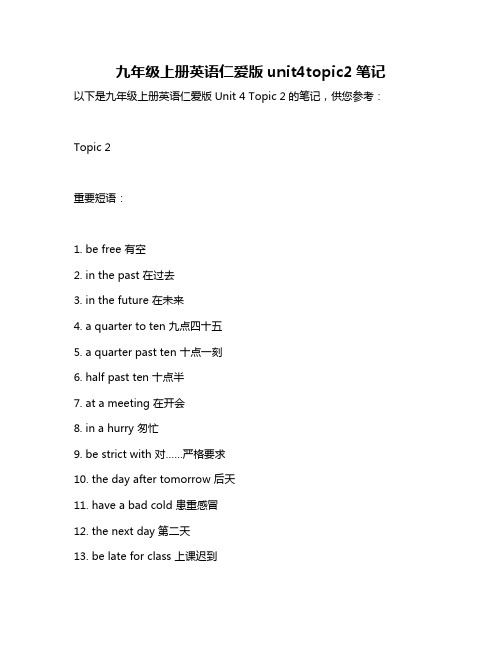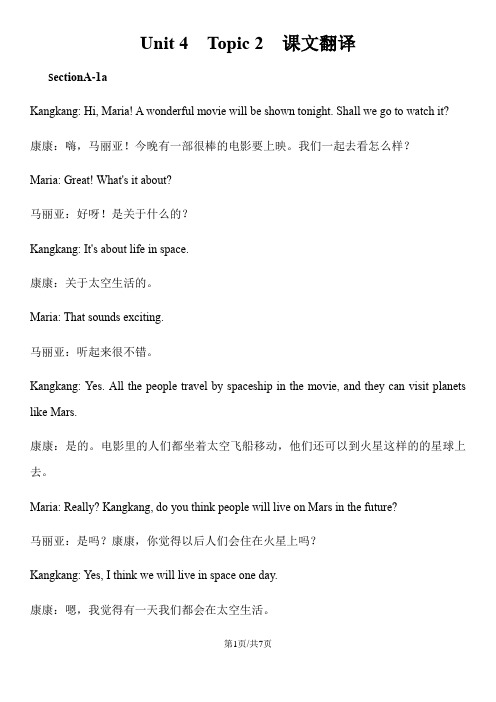最新仁爱版英语九年级上册Unit 4 Topic 2 整个话题 四个部分公开课课件
- 格式:ppt
- 大小:12.14 MB
- 文档页数:77

Unit4Topic2SectionA教学设计Ⅰ.Material analysis本课是九年级第四单元第二话题的第一课时。
主活动是1a和2a。
1a通过Kangkang和Maria谈论即将放映的电影来引入新时态:一般将来时的被动语态。
除了引入新时态,也引入了新话题:未来的新事物。
1b以训练听力技能为主,让学生在听觉上感受新时态。
1c通过把对话转换成短文的形式,让学生巩固1a的内容。
2a要求学生观察、体验新时态的构成。
2b则要求学生能基本运用新时态。
3在内容上承接了2b。
2b提到有些科学家认为在外太空存在外星人。
3则是以听力的形式来呈现Kangkang和Maria对此问题的讨论,并且在听的过程中,学生要完成两个任务,进一步训练听力技能。
Ⅱ.Teaching aims1.Knowledge aims:掌握本课的重点词汇和短语,初步学习一般将来时的被动语态。
2.Skill aims:能够通过2a环节,自行找到一般将来时的被动语态的构成方法。
能够根据时间名词,正确的运用已经学习过的被动语态。
3.Emotional aims:(optional)4.Culture awareness:(optional)Ⅲ.The key points and difficult points1.Key points:Words and phrases:screen,display,alien,in the future,one day,be able to do sth., come true,in order to,learn aboutSentences:What fun!I can’t wait.A wonderful movie will be shown tonight.Houses,schools,and hospitals will be built on Mars.I hope our dreams of space travel will come true.Grammar:will+be+pp2.Difficult points:We will be able to do anything that can be done on the earth.I won’t believe there are aliens until I see them with my own eyes.Ⅳ.Learning strategies能够通过2a的示范,领悟一般将来时的被动语态的构成,自主对新知识进行初步总结、归纳。


仁 爱 九 上 -Unit4 Topic2v .显示,显露;展示n .屏幕;银幕v .掌握,精通 n .主人n .跳舞者 ,舞蹈演员v .(rea l i se BrE)意识到 ,领会;实现n .宇宙ad j .古罗马的 ,古罗马帝国的n .上帝;神s tor mgravi tyweighadv .一般地 ,通常n .(尤指长途 )旅行v .限制,限定 n .限度;限制n .激动;令人激动的事 v .发射;发起;发行 prep . 超出;除……之外 外层空间exc i tementlaunchbeyondouter spacedia meter n.直径重点短语:1. l ive on Mars居住在火星上2. l ive in space居住在太空3.on the ea r th在地球上4.can’t wait to do sth. 迫不及待做某事5.be ab le to能够6. t ake par t in/j oin in参加(活动)7.admire sb.for(do ing)s th.因为(做)某事羡慕某人8.g row up成长,长大9.mas te r some bas ic compute r s ki l l s掌握一些基本的电脑技能10.per form ba l le t表演芭蕾11.pre fe r do ing s th.to do ing s th.比起做某事更喜欢做某事12.know l i t t l e about几乎不了解13.by chance偶然14.be named a f t er以……命名15.倍数/分数/百分数+ as…as… 相当于……几倍/几分之几/百分之……16.go/t rave l/c i rcl e a round围绕……旋转17.at a distance of… 相距……18.be covered by/wi th被……覆盖19.I t t akes sb.some t ime to do s t h.花费某人多少时间做某事20.be c lose to与……靠近,紧挨着21.search fo r s th.搜寻某物search sp.fo r s th.某地搜寻某物22.I t i s +时间段+s ince从句I t has been +时间段+s ince从句时间段+ has passed +s ince从句23.in genera l/genera l ly speak ing/genera l ly总的来说24.go wel l进展顺利25.what’s worse 糟糕的26.the use of ……的用途27.another +数词+名词复数=数词+more+名词复数another t wo days =two m ore days28.be wor th do i ng s th.值得做某事29.wish sb.luck祝某人好运30.there have/has been…有……(there be 句型现在完成时结构)31.ou ter space外层空间32.一般将来时被动语态:wi l l be +p.p词形转换:1.we igh v.重,有……重we igh t n.重量2.exc i t e v.激动,使(人)兴奋exc i ted ad j.激动的,兴奋的exc i t ing ad j.令人激动的exc i tement n.激动,令人激动的事3.d i scover v.发现discovery n.发现4.d ry v.使……干燥ad j.干燥的v.供应5.supp ly n.[U]供应;[C]供应品6.wor th p rep.值…… n.价值wor thy ad j.有价值的wor th less ad j.无价值的重点句型:1. A wonder fu l m ovie wi l l be shown ton igh t.一场精彩的电影今天晚上将被上映。

仁爱版英语九年级上册Unit2-Unit4知识点归纳U2 Topic 2I. 重点词组1. as a result 结果2. here and there 到处3. in the beginning 一开始4. in danger 处于危险中5. cut down 砍倒6. change sth. into sth. 把……变成……7. prevent from 防止8. greenhouse effect 温室效应9. refer to 提到10.deal with 处理11.take up 占据12.cut off 中断II. 重点句型1. As we know, none of us likes pollution. 众所周知,没有人喜欢污染。
none与no one 的区别:a)none “全无”,既可指人也可指物,后常跟of 的短语; 作主语时,谓语动词既可用单数也可用复数;no one只指人,后不能跟of 的短语; 作主语时,谓语动词只用作单数。
如:He has read none of these books.(指物)这些书他一本都没看过。
None of my friends like/ likes drawing.(指人)我的朋友们没有一个喜欢画画。
No one is here.没有一个在这儿。
b)none回答how many/ much的问题;no one回答who的问题。
如:A: How many students come to school by taxi? B: None.有多少的学生搭出租车来上学?没有人。
A: How much water is there in the bottle? B: None.瓶子里有多少水?一点儿也没有。
A: Who is in the room? B: No one.谁在房中?没有人。
2、Trees can also stop the wind blowing the earth away.树木也能防风固土。

Unit4 Topic2 课文重难点讲解【1】We will be able to do anything that can be done on the earth. 我们可以做在地球上能做的任何事情。
(1) that can be done on the earth 定语从句修饰anything。
如:We’ll raise money for the children who live in the poor areas.(定语从句修饰children)我们将为那些生活在贫困地方的孩子筹集资金。
The car which (that) I hired broke down. (定语从句修饰car)我租的汽车坏了。
(2)从句的谓语用的是带有情态动词的被动语态,构成的形式为“情态动词+be +及物动词的过去分词〞。
如:These trees must be planted tomorrow. 这些树必须在明天栽种。
More satellites will be sent into space. 更多的人造卫星将会被发射进人太空。
【2】One American scientist thinks they have already come to the earth, and they are reading information on the Internet in order to learn about human culture. 一位美国科学家认为他们已经来过地球,并且正在互联网上阅读信息,以便学习人类的文化。
in order to…意为“为了......〞,表示目的,后接动词原形,相当于so as to。
in order to既可放在句首又可放在句中,so as to只能放在句中,不可放在句首。
它们的否认形式都是在to前加not,即in order not to, so as not to,它们后面只能接动词原形,如果需接目的状语从句可用in order that或so that。

1.现在完成时的用法:表示过去某一时间发生的动作或存在的状态,对现在仍有影响。
e.g. I have just posted the letter. 我刚把信邮寄了。
She has lost her watch. 她弄丢了手表。
2.现在完成时可以和不明确指出时间的状语连用,如already, yet,just,before, ever, lately, once等。
e.g. Have you heard from your friend lately?你最近收到你朋友的来信了吗?3.现在完成时也可以和包括现在在内的时间状语连用。
如this week, thismorning, today, thisyear等。
e.g. They have moved three times this year. 今年他们已经搬了三次家。
4.现在完成时不能和明确表示过去时间的状语连用。
如yesterday, last week, in 1999, two days ago,just now, when I came in等。
Unit 1-topic3现在完成时(Ⅲ)1.现在完成时表示从过去某一时刻延续到现在的动作或状态,常与for,since引导的状语连用。
for+一段时间,since+过去时间点或从句(从句的谓语动词用过去式)。
e.g. I have lived here for twenty years.我住在这里已有20年了。
We have built many factories since 1985.自1985年以来,我们建了许多工厂。
He has always helped me with my English since he came here.自从他到这里以后,他总是帮助我学习英语。
2.有的动词所表示的动作不是瞬间就可以完成的,要持续一段时间,这样的动词叫延续性动词。
不能延续下去的动词,叫非延续性动词或瞬间动词。

九年级上册Unit 4 Topic 2 I’m excited about the things that will be discovered in the future.Section D【教学构思】一、教材分析:本课属于课标话题人与自然——“科普知识与现代技术(Popular science and modern technology)”中科普知识(Popular science)项目,主要介绍太阳系的知识。
主要教学活动为1a,2和3,学生通过阅读了解太阳系的知识,获取主要信息,进一步提高阅读能力。
2写作介绍地球,综合运用所学知识,培养“写”的语言能力。
3小组讨论,鼓励学生思考,分析和交流,培养学生“说”的语言能力。
Section D第一个部分的内容,总结本话题所学语法和功能,在复习时发现学生存在的问题,及时解决问题。
二、设计说明:根据学情和本课的语法及话题,先复习本话题所学语法和功能,补缺补漏,融会贯通。
通过阅读1a了解太阳系的知识,获取主要信息。
读后写作介绍地球,小组讨论畅想发现外星人后的未来世界,培养学生“说”和“写”的语言能力。
本课在重、难点突破的方法上有所创新,教师通过竞赛方式复习本话题所学语言语法知识,既能引导学生有效复习,又能激发学生积极性和主动性。
在写作和小组活动中,综合运用本话题所学知识。
【教学目标】1. 复习本话题语法和功能,能够正确使用所学语法和功能,培养综合语言能力;2. 通过阅读把握语篇基本结构,获取主要信息,培养“读”的语言能力;3. 课前搜索信息,课上小组讨论交流信息,并写短文介绍地球,训练学信息整合能力和“写”的语言能力;4. 通过小组活动,充分发挥想象力,培养思维品质和与人为善的品质。
【教学重难点】1. 正确使用一般将来时的被动语态;2. 独立起草作文。
【教学方法】任务型教学法【教具】多媒体设备,教学课件【教学过程】Step 1. GreetingStep 2. Review1. Review the words and phrases in this topic by playing games.2. Review the grammar in this topic by doing some exercises and fill in the blanks of Grammar and Functions. Students can do the exercises through competition to see which group can complete the exercises fastest and most correctly.(设计意图:通过希沃设计竞赛和游戏方式,复习本话题语法和功能,既能帮助学生梳理记忆本课重点知识,及时补缺补漏,又能激发学生兴趣和积极性。



九年级上册英语仁爱版unit4topic2笔记以下是九年级上册英语仁爱版Unit 4 Topic 2的笔记,供您参考:Topic 2重要短语:1. be free 有空2. in the past 在过去3. in the future 在未来4. a quarter to ten 九点四十五5. a quarter past ten 十点一刻6. half past ten 十点半7. at a meeting 在开会8. in a hurry 匆忙9. be strict with 对……严格要求10. the day after tomorrow 后天11. have a bad cold 患重感冒12. the next day 第二天13. be late for class 上课迟到14. as soon as 一……就……15. in time 及时16. look forward to 盼望17. be on 在上演,上映18. stay healthy 保持健康19. catch up with 赶上20. keep healthy 保持健康21. all the time 一直,始终22. be popular with 受……欢迎23. at the moment 现在,此刻24. be sure about 对……有把握25. make sure 确信,确保26. the first/second/third time 第一次/第二次/第三次……27. the + 比较级,the + 比较级表示“越……越……”28. that’s why… 那是因为……29. would rather do sth than do sth else 宁愿做某事而不愿做另一件事 doing sth to doing sth else 更喜欢做某事而不是做另一件事+序数词,表示“第几……”one’s +序数词+生日,表示“在某人的第几个生日”one’s +整十基数词的复数形式,表示“在某人几十多岁的时候”the +节日的英文名称,表示“在某个节日”then on 从那时起/get ready for sth 为某事做准备/get excited about sth 对某事感到兴奋、激动。

仁爱英语九年级Unit4 Topic2SectionA康康:嗨,玛丽亚!一部非常精彩的电影将要今晚上映。
我们一起去看吧?玛丽亚:太好了!是关于什么的?康康:是关于太空生活的。
玛丽亚:听起来好刺激。
康康:是的。
在影片里,所有人都可以乘坐宇宙飞船遨游太空,他们还可以拜访其他星球,例如火星。
玛丽亚:真的吗?康康,你觉得将来人们会在火星上居住吗?康康:是的。
我认为有一天我们会在太空中生活的。
房屋、学校和医院都会在火星上修建。
我们将可以做在地球上能做的一切事情。
玛丽亚:多有趣啊!我都迫不急待了。
Section B康康:玛丽亚,你听说了太空飞行去火星的电视新闻吗?玛丽亚:没听说过。
谁会参加这次飞行?康康:来自中国、美国和俄罗斯的宇航员。
他们要去太空探索关于火星的新发现。
我真崇拜他们。
等我长大了,我也想当一名宇航员。
玛丽亚:太棒了!不过,我觉得你应该先掌握一些基本的电脑技能。
康康:你说得对。
玛丽亚,你将来想做什么?玛丽亚:嗯,我还不清楚。
有时候,我想当一名舞蹈家,但是我想将来我会做一名科学家。
康康:为什么呢?我觉得你跳舞跳得很好啊!玛丽亚:不错,将来我肯定会在舞台上表演芭蕾。
但是相比较而言,我更喜欢科学。
它是我最喜欢的学科。
我对将来要被发现的事物感到很兴奋。
康康:太好了!我们努力学习吧!这样,我们就会实现我们的梦想了。
Section C你对火星的了解有多少?它长什么样?火星在太阳系中,是距离太阳第四远的星球,它以罗马战神玛尔斯的名字命名。
它的直径是地球直径的53%。
火星在距太阳约228,000,000千米处环绕着太阳转。
你可以清楚地分辨哪一颗行星是火星,因为它在夜空中是鲜红色,看起来像一个橘红色的圆球,非常漂亮。
但是在春夏两季,火星的表面会被强风暴覆盖。
火星表面的引力大约是地球引力的五分之二。
因此,一个在地球上称重90千克的人在火星上的称重仅36千克。
火星上的温度介于-138 ℃和28℃之间。
空气中的氧气含量仅为0.13%。

Unit 4 Topic 2(满分100分,时间90分钟)第一部分听力(20分)Ⅰ.听对话,选择正确图片。
每段对话读一遍。
(5分)1._____2._____3._____4._____5._____Ⅱ.听句子,选择正确答案。
句子读一遍。
(5分)( )6.A.Tom. B.In America. C.In 1885.( )7.A.Helping people see in the dark.B.Helping us to see in the daytime.C.Helping us to walk in the dark.( )8.A.I agree. B.Not bad. C.Thank you.( )9.A.OK. B.That’s right. C.That’s wonderful.( )10.A.Shenzhou VI. B.Shenzhou Ⅴ. C.Shenzhou IV. Ⅲ.听短文,选择最佳选项。
短文读两遍。
(5分)( )11.The invention of paper meant that ________.A.more people could be educatedB.more books could be printedC.humans could have more knowledge( )12.Paper was invented in southern Europe ________.A.about 2000 yeans agoB.before the year 1100C.after the year 1100( )13.According to the passage, ________ are made of paper.A.newspapers and envelopsB.letters and pencilsC.books and desks( )14.In the old days, paper could be used for ________.A.preventing the warmthB.making clothesC.covering windows( )15.The main idea of this passage is ________.A.the invention of paperB.the uses of paperC.the paper-makingⅣ.听短文,选择正确答案。





Unit 4 Topic 2 课文翻译S ectionA-1aKangkang: Hi, Maria! A wonderful movie will be shown tonight. Shall we go to watch it?康康:嗨,马丽亚!今晚有一部很棒的电影要上映。
我们一起去看怎么样?Maria: Great! What's it about?马丽亚:好呀!是关于什么的?Kangkang: It's about life in space.康康:关于太空生活的。
Maria: That sounds exciting.马丽亚:听起来很不错。
Kangkang: Yes. All the people travel by spaceship in the movie, and they can visit planets like Mars.康康:是的。
电影里的人们都坐着太空飞船移动,他们还可以到火星这样的的星球上去。
Maria: Really? Kangkang, do you think people will live on Mars in the future?马丽亚:是吗?康康,你觉得以后人们会住在火星上吗?Kangkang: Yes, I think we will live in space one day.康康:嗯,我觉得有一天我们都会在太空生活。
Houses, schools and hospitals will be built on Mars.房子、学校和医院都会建在火星上。
We will be able to do anything that can be done on the earth.在地球上能做的事也能在火星上做。
Maria: What fun! I can't wait.马丽亚:太有趣了!我等不及了。
SectionB-1aKangkang:Maria, have you heard the news on TV about the space flight to Mars?康康:马丽亚,你有没有听电视上关于飞往火星的新闻呀?Maria:No, I haven't. Who will take part in the space flight?马丽亚:还没有。